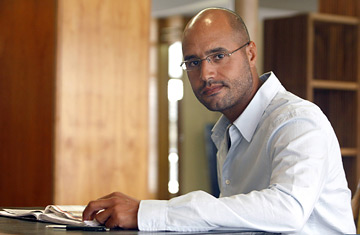
Saif al-Islam, son of Libyan leader Muammar Gaddafi
Once the quintessential "rogue state," Libya is now doing its best to shed an enduring reputation as a sponsor of terror and reintegrate into the international community. "Lockerbie belongs to the past — it's history," assures Saif al-Islam Gaddafi, second-born son and potential heir of Libyan leader Muammar Gaddafi, referring to the deadly 1988 bombing of a Pan Am jet over Scotland, one of several terror attacks for which Libyan agents have been tried and convicted. Though Libya denies responsibility for those attacks, Gaddafi acknowledges they, together with the country's provocative stance toward Western nations over the past quarter century, have complicated efforts to normalize its diplomatic relations. "The time for confrontation and war is over," Gaddafi, 34, told TIME during an interview in the southern French city Nice. "Things have already changed with the West, with the Americans. We can move ahead together."
Libya's boldest move to repair relations with the West came in 2003, when it announced the scrapping of its nuclear, chemical and biological weapons programs — an act the U.S., Britain, and other Western governments had demanded as prerequisite for renewing relations with Tripoli. Bilateral contacts have increased since, including partnerships between Western and Libyan intelligence services that Gaddafi and European officials credit for thwarting terror attacks on both sides of the Mediterranean. Outgoing British Prime Minister Tony Blair traveled to Tripoli in May to hail Libya's "completely transformed" behavior, and predicted that the flourishing security and defense relationship between the two nations would soon be followed by a business boom as well.
Not to be outdone by the Brits, French president Nicolas Sarkozy last month cut a deal for the release of six Bulgarian medics held by Libya for the past eight years on trumped-up charges of having willfully infected nearly 440 Libyan children with HIV. In the diplomatic razzle-dazzle that secured their freedom, Sarkozy also managed to leave French companies ideally placed in the race for opportunities to invest in Libya's oil-rich economy. Resolution of the Bulgarian stand-off also removed the last major hurdle for full normalization of diplomatic ties between Libya and the European Union. And the U.S. also wants in on the act: Last month, Washington named its new ambassador to Tripoli, and plans to send Secretary of State Condoleezza Rice to visit soon.
Why the sudden rush to embrace a nation once lumped among Washington's most loathed regimes? According to Saif Al-Islam Gaddafi, who played a central role in negotiating the release of the Bulgarians, it's because Libya has proven it wants to help solve problems rather than create them. Gaddafi says Libya has mediated several conflict and crisis situations in Africa, including Darfur and Niger. That role, he says, has made the nation "the main diplomatic actor in North Africa." Gaddafi also confides Libyan diplomats have advised Blair on his Middle East mission, and have sought to facilitate his contacts with Hamas.
"People in conflict in the region come to Libya to seek resolution," Gaddafi says with pride of the country's improved reputation and growing influence. "They don't go to Egypt or Algeria." Perhaps, although Libya's ability to influence many of the Middle East's key conflicts remains limited.
Skeptics, however, note that Libya's new profile is a product of the same thuggish authoritarian power structure that has ruled the country since 1969. And they suggest that the principles on which Libya is resolving problems sometimes amount to extortion. For example, the release of the Bulgarians — spurious though their convictions may have been — saw still undisclosed donor nations acting on behalf of the E.U. shell out $460 million in damages for the Libyan victims of HIV infection, and also landed Tripoli diplomatic and commercial rewards that include the construction of a nuclear power plant. Even worse, French daily Le Monde reports that deal also involved French promises to sell $100 million in arms to Libya, and a pledge that a Libyan agent serving prison time in the U.K. for his involvement in the Lockerbie bombing would be transferred to Tripoli, where he would likely be released. The governments of France and Britain denied those allegations, but less than 48 hours after the Le Monde report, Libya unilaterally announced it had indeed signed a deal to buy over $371 million in arms and military equipment from Franco-German defense and aerospace giant EADS. That confounding (and doubtless vexing) Libyan indiscretion forced French officials to variously minimize the deal as still being limited to "letters of intent" to purchase — and claim it to be a private business matter totally unrelated to the Bulgarians' release the week before.
Even Libya's 2003 decision to scrap its weapons of mass destruction program is sniffed at by some experts. Although the Bush Administration liked to attribute that move to the intimidating effects of its Iraq invasion, some independent experts suggest it was more a case of giving up poorly performing and relatively useless programs in return for almost total diplomatic rehabilitation.
Gaddafi rejects these accusations, insisting that negotiations over what he stresses was "the purely legal issue" of the Bulgarian case resulted from incessant Western pressure to "interfere and shift a legal issue to a political" arena. Still, he acknowledges that resolution of the issue opens the way for Libya gains on the diplomatic and business fronts. Meantime, Gaddafi says he'll continue working on liberalizing and democratizing the dictatorship built by his father since 1969 — a notion scoffed at by human rights organizations. Responding to doubts that the regime could reform to the point of releasing its iron grip on power, the younger Gaddafi says neither his father nor the nation has much choice.
"Whether you like it or not, the future is with more liberalism, more freedom, with democracy," urges Gaddafi. "This is the evolution of the entire world, and you either go with it or be left behind."
